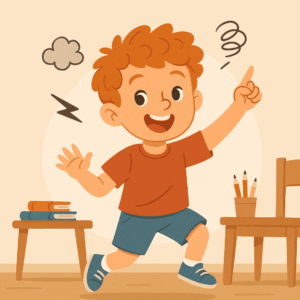How to Know if Your Child Has ADHD – Parent’s Guide
Is your child unusually restless? Do they struggle to sit still, follow instructions, or finish tasks—even ones they enjoy? You’re not alone in wondering if it’s just “childish energy” or something more.
Let’s unpack what ADHD (Attention-Deficit/Hyperactivity Disorder) looks like—and what parents can do about it.
🚩 Common Signs of ADHD in Children
ADHD often shows up in one or more of these three ways:
1. Inattention
-
Difficulty focusing on homework or stories
-
Often makes careless mistakes
-
Appears not to listen even when spoken to directly
-
Frequently loses things (books, water bottles, pencils)
-
Easily distracted by unrelated noises or events
2. Hyperactivity
-
Constantly on the move—running, climbing, fidgeting
-
Talks excessively or interrupts often
-
Struggles to wait their turn
-
Cannot stay seated in class or at the dinner table
-
Acts without thinking
3. Impulsivity
-
Blurts out answers
-
Interrupts conversations or games
-
Gets into trouble without realizing why
These signs must be frequent, present in more than one setting (e.g., home and school), and interfere with daily functioning to suggest ADHD.
📌 When to Get Concerned
Not every child who’s fidgety or distractible has ADHD. But you might consider a professional evaluation if:
-
Teachers report behavior concerns
-
Homework takes hours, with frustration or tears
-
Your child often says, “I can’t help it” or feels bad about themselves
-
There’s a family history of ADHD or learning difficulties
🧠 How Is ADHD Diagnosed?
A comprehensive ADHD evaluation includes:
-
Detailed history-taking (birth, development, school reports)
-
Standardized rating scales (completed by parents and teachers)
-
Clinical observation
-
Psychometric testing (in select cases)
-
Brain mapping (QEEG) – optional but useful for neurodevelopmental insight
At my clinic, we use a multi-method assessment combining clinical tools with optional brainwave analysis for a fuller picture.
✅ What You Can Do As a Parent
-
Keep a behavior diary – track when, where, and how symptoms show up
-
Talk to teachers – they see your child in structured settings daily
-
Avoid blame – ADHD is not due to “bad parenting”
-
Get professional help – early diagnosis makes a big difference
-
Explore therapies – medication, behavior therapy, parent training, and attention training can help
Why Early Help Matters
Children with untreated ADHD may struggle academically, socially, and emotionally. But with the right support, they can thrive—in school, at home, and in life.
Consult Me at Mind & Memory Lab, Chennai
🧠 Child ADHD Screening
🧠 QEEG-based Brain Mapping
🧠 Attention Therapy & Parent Coaching
📍 Available in Velachery, Tambaram, and Online
Dr. Srinivas Rajkumar T
Consultant Psychiatrist
Apollo Clinics Velachery & Tambaram
Website: www.srinivasaiims.com
📞 Book Now: 85951 55808